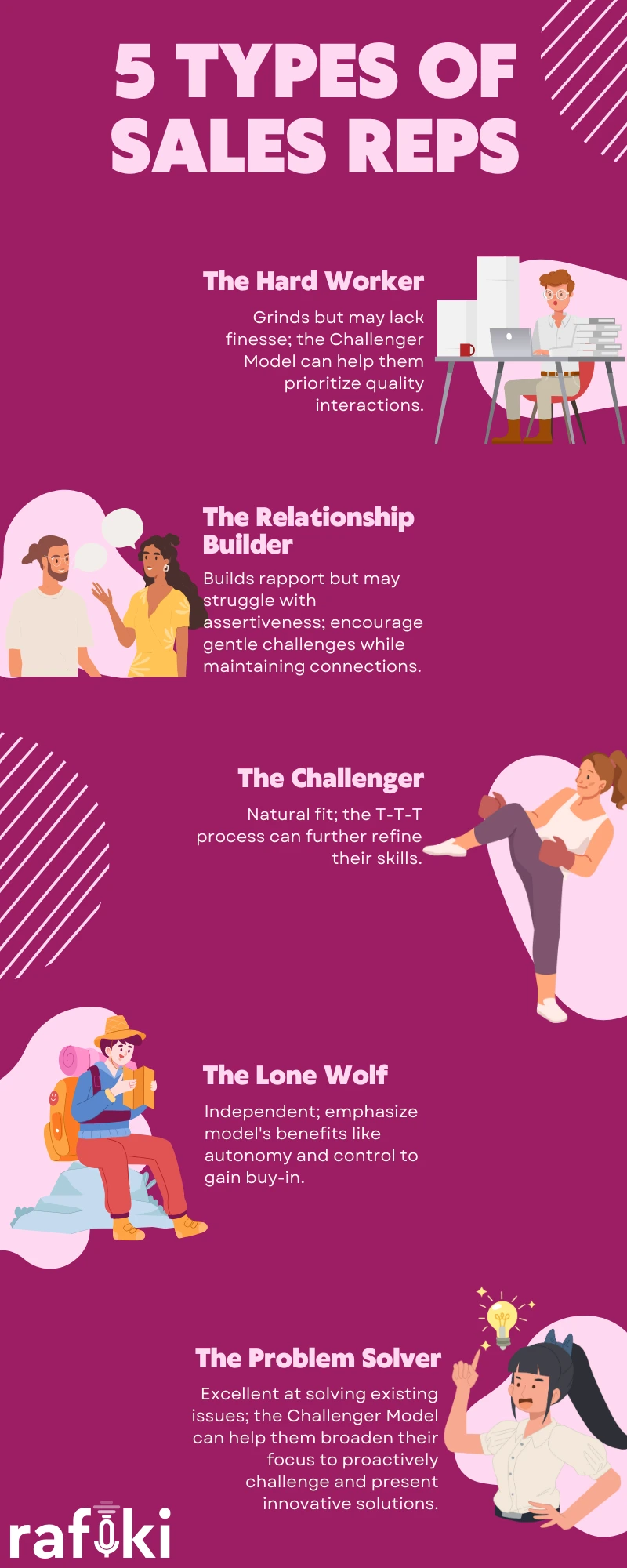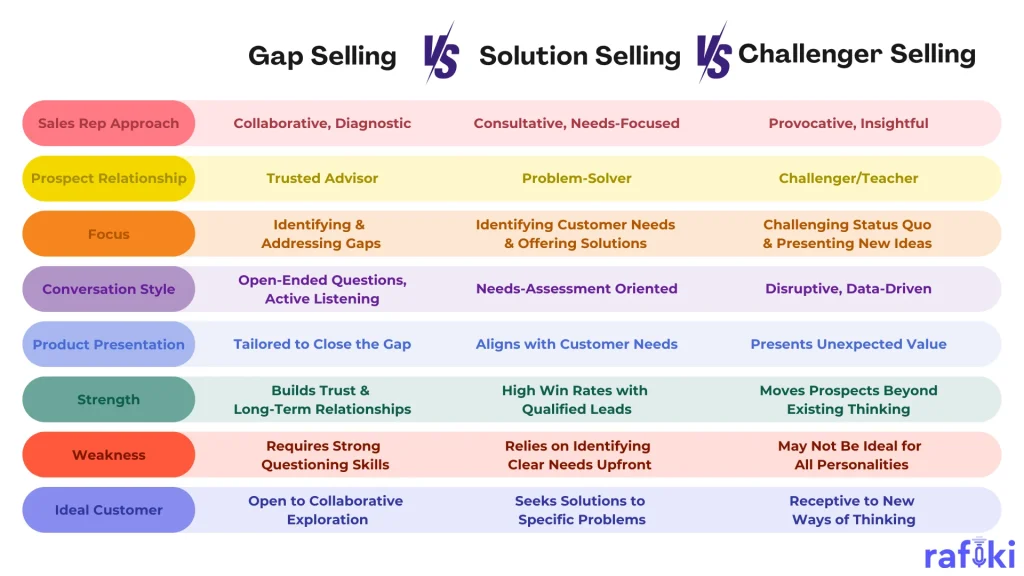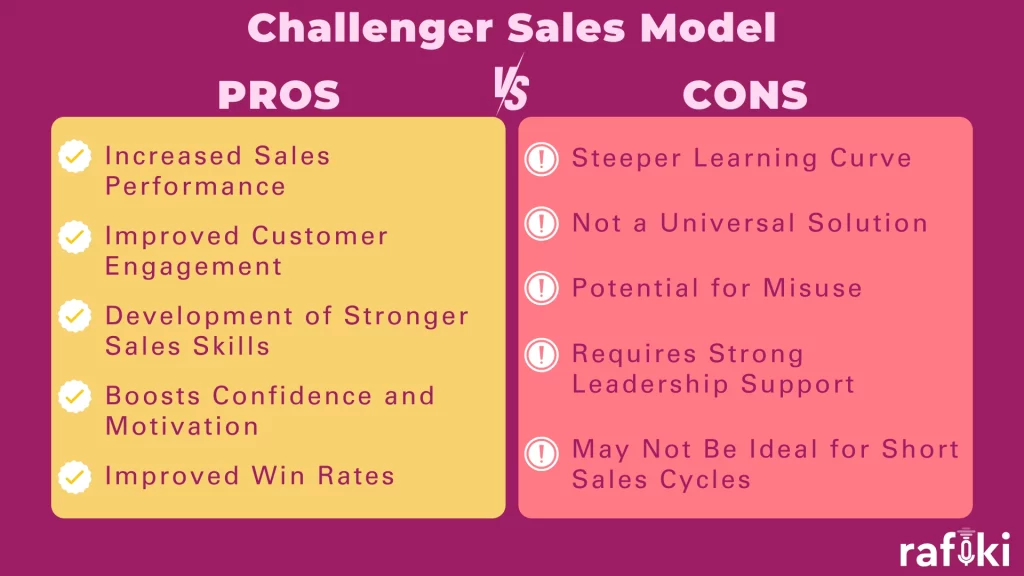Why Rafiki
Pricing


Pricing
Solutions

RevOps Leaders
Synchronize revenue generating functions

SDR Leaders
Get your team aligned and Coach your Reps 3x faster at scale

Sales Leaders
Unlock pipeline truth, drive confident forecasts

The B2B sales landscape is undergoing a seismic shift. Today's informed buyers are armed with more information than ever before, and their expectations have risen in tandem. Gone are the days of pushy sales tactics and generic pitches. To thrive in this new environment, sales leaders need to equip their teams with the tools and strategies that resonate with modern buyers. Enter the Challenger Sales Model.
The Challenger Model is a methodology designed to empower reps to engage in meaningful conversations, challenge customer assumptions, and ultimately, drive superior sales performance. This comprehensive guide will delve into the intricacies of the Challenger Model, explore its potential benefits and drawbacks, and equip you with the knowledge to assess its suitability for your sales team.
So, let’s dive in!

At its core, the Challenger Sales Model hinges on three fundamental principles: teach, tailor, and take control. Let's unpack each of these pillars:
The Challenger rep sheds the traditional salesperson persona and transforms into a trusted advisor. They achieve this by conducting thorough research on the prospect's business, challenges, and industry trends. Armed with this knowledge, they engage in insightful conversations, educating the prospect on blind spots and new perspectives they might not have considered. Imagine a financial advisor not just pushing products, but also educating you on long-term investment strategies and potential risks you might be overlooking. That's the essence of "teaching" in the Challenger Model. This involves:
Effective sales conversations aren't one-size-fits-all monologues. Challenger reps excel at tailoring their approach to each unique customer. They actively listen to the prospect's concerns, understand their specific needs and goals, and then customize their solutions accordingly. This personalized approach fosters trust and demonstrates a genuine understanding of the customer's situation. This involves:
Here's where the "challenger" aspect comes into play. Unlike traditional reps who passively follow the prospect's lead, Challenger reps skillfully guide the conversation. They do this by, for instance, gently challenging the prospect's assumptions or presenting alternative perspectives that spark deeper thinking. This doesn't mean being confrontational; it's about fostering a healthy dialogue that pushes the prospect beyond their comfort zone and towards a mutually beneficial outcome. This involves:
Now, the "art of the challenge" lies in striking the right balance. While challenging assumptions can be a powerful tool, it's crucial to do so with respect and a genuine desire to help the prospect succeed. Think of it as a friendly debate, not an aggressive confrontation.
By mastering these core principles, Challenger reps can build stronger relationships with prospects, differentiate themselves from the competition, and ultimately, close more deals. Rafiki's Smart Call Scoring can be a valuable tool here, as it can help you identify areas where reps might be excelling at "teaching" or "tailoring" their approach, and also pinpoint opportunities to refine their "take control" skills based on specific call data.
After learning what the Challenger model is, if you feel that it's not suitable for your sales org, explore other methodologies like Gap Selling or Solution Selling. Here's a quick comparison:

The success of the Challenger Model hinges on the capabilities and characteristics of your sales reps. Here are some key traits that distinguish effective Challenger reps:
Forget about generic pitches and one-size-fits-all solutions. Challenger reps are laser-focused on understanding their customers' unique needs, challenges, and aspirations. This requires conducting thorough research, actively listening during conversations, and demonstrating a genuine interest in the prospect's success.
Challenger reps aren't just salespeople; they're trusted advisors. They possess the ability to educate prospects on industry trends, potential blind spots, and innovative solutions they might not have considered. This requires strong communication skills, the ability to explain complex concepts clearly, and a passion for knowledge sharing.
Effective communication is the cornerstone of the Challenger Model. Reps need to be articulate, persuasive, and adept at tailoring their communication style to different audiences. Additionally, negotiation skills are crucial for navigating challenging conversations and reaching mutually beneficial agreements.
Not every conversation will be smooth sailing. Challenger reps need to be resilient in the face of objections and possess the skills to navigate them constructively. This involves actively listening to understand the root cause of the objection, addressing it with empathy and logic, and presenting compelling solutions that overcome the prospect's concerns.
The sales landscape is constantly evolving, and successful Challenger reps are lifelong learners. They are open to new ideas, embrace feedback, and continuously refine their skills to stay ahead of the curve.
So, you've decided the Challenger Model holds promise for your sales team. Before we look at how to implement the model, let's remind ourselves of the pros and cons of the model:

Now that you've got the complete picture, what' comes 's next is the crucial step of implementation. Here are some key strategies to ensure a smooth and successful adoption process:
Leading by example is vital. Sales leaders need to wholeheartedly embrace the model themselves and become vocal advocates for its benefits. This sets the tone for the entire team and demonstrates the organization's commitment to this new approach.
The Challenger Model requires a shift in mindset and skill set for many reps. Invest in high-quality training programs that equip them with the necessary knowledge, tools, and techniques to excel in this methodology. Ongoing coaching and mentorship further solidify their understanding and provide personalized guidance for real-world application.
Sales technology can be a powerful ally in implementing the Challenger Model. For instance, Rafiki's 2-way CRM sync can ensure data accuracy and eliminate manual entry tasks, freeing up valuable time for reps to focus on strategic conversations. The sync feature can make sure that key fields in your CRM are autofilled based on the prospect’s answers.
Additionally, explore features like Rafiki's Smart Follow Up which automatically generates personalized follow-up emails based on call details, saving reps time and ensuring timely communication with prospects.
Track key performance indicators (KPIs) to measure the impact of the Challenger Model on your sales team's performance. Analyze data on win rates, deal size, and customer satisfaction to identify areas for improvement and celebrate successes. Additionally, create a culture of recognition and reward that reinforces desired behaviors and motivates reps to continuously hone their Challenger skills.
The sales landscape is constantly evolving, and so should your reps' skillset. Encourage continuous learning through industry publications, online courses, and participation in professional development opportunities.
Additionally, foster a culture of open communication and feedback. Regularly solicit feedback from reps on their experiences with the Challenger Model, and use their insights to refine your implementation strategy and ensure it continues to resonate with your team.
The B2B landscape demands reps who educate, not just sell. The Challenger Model equips them with the tools to do just that. By mastering "teach, tailor, and take control," reps become trusted advisors, fostering deeper relationships and closing more deals.Embrace continuous learning, refine your approach, and empower your reps to excel in the modern sales landscape.
Implement & Track Challenger Sales Model
Successful implementation requires leadership buy-in, comprehensive training, and leveraging technology like Rafiki to streamline workflows and gain valuable call insights. Take the first step today! Explore how Rafiki can help you implement the Challenger Sales Model in your org today - sign up for a free 14 day trial!